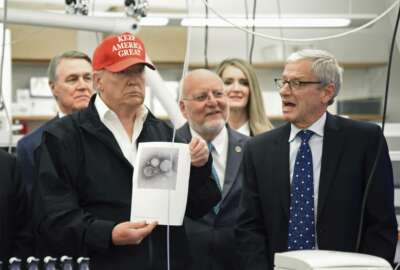
DoD loosens telework policy in preparation for coronavirus spread
New DoD guidance says employees can telework even if they're also caring for a sick dependent at home.
The Pentagon is slightly easing the rules that govern how its civilian employees can telework as part of its preparations for a possible larger outbreak of the novel coronavirus.
The new rules make clear that civilian workers who are authorized to telework can still do so even if they’re also taking care of a sick child or relative in their home. The temporary exception to policy is in effect through December, loosening the department’s admonitions against using telework as “a substitute for dependent care.”
The change, signed by Dr. Alexis Ross, who is performing the duties of the undersecretary of Defense for personnel and readiness, was released on Monday as part of a broader package of coronavirus guidance for military commanders and DoD agency heads.
In general, the guidance largely mirrors the governmentwide suggestions the Office of Personnel Management has already issued. Among other things, leaders are being told to maximize the number of employees who are authorized to telework. And they’re being “strongly encouraged” to sign “ad-hoc” telework agreements that cover all telework-eligible employees who don’t already have a signed agreement.
In addition, DoD component leaders are being told to conduct tests of their IT networks to make sure their systems can handle the increased traffic flows from a surge in teleworkers, similar to the drill the Air Force conducted among employees at its Pentagon headquarters last week.
The guidance also covers what sorts of virus-preventative supplies can and can’t be bought with federal funds at the local level. Hand sanitizer, for example, is allowed. But masks and gloves are not — unless they’re specifically for DoD employees who are already authorized to wear personal protective equipment as part of their jobs.
For military commanders, the guidance also sets up a five-tiered “risk-based” framework that outlines the steps they should take depending on how severe the virus’s spread has become in a particular area.
If infection rates reach the most serious category — “widespread community transmission” — it suggests commanders consider cancelling public gatherings, quarantining their personnel, and restricting people’s movement in and out of the area.
“This outbreak is dynamic and manifests differently by location, setting, population and individual,” Defense officials wrote. “As a result, responses will need to be flexible, tailored and incremental.”
Copyright © 2024 Federal News Network. All rights reserved. This website is not intended for users located within the European Economic Area.
Jared Serbu is deputy editor of Federal News Network and reports on the Defense Department’s contracting, legislative, workforce and IT issues.
Follow @jserbuWFED






